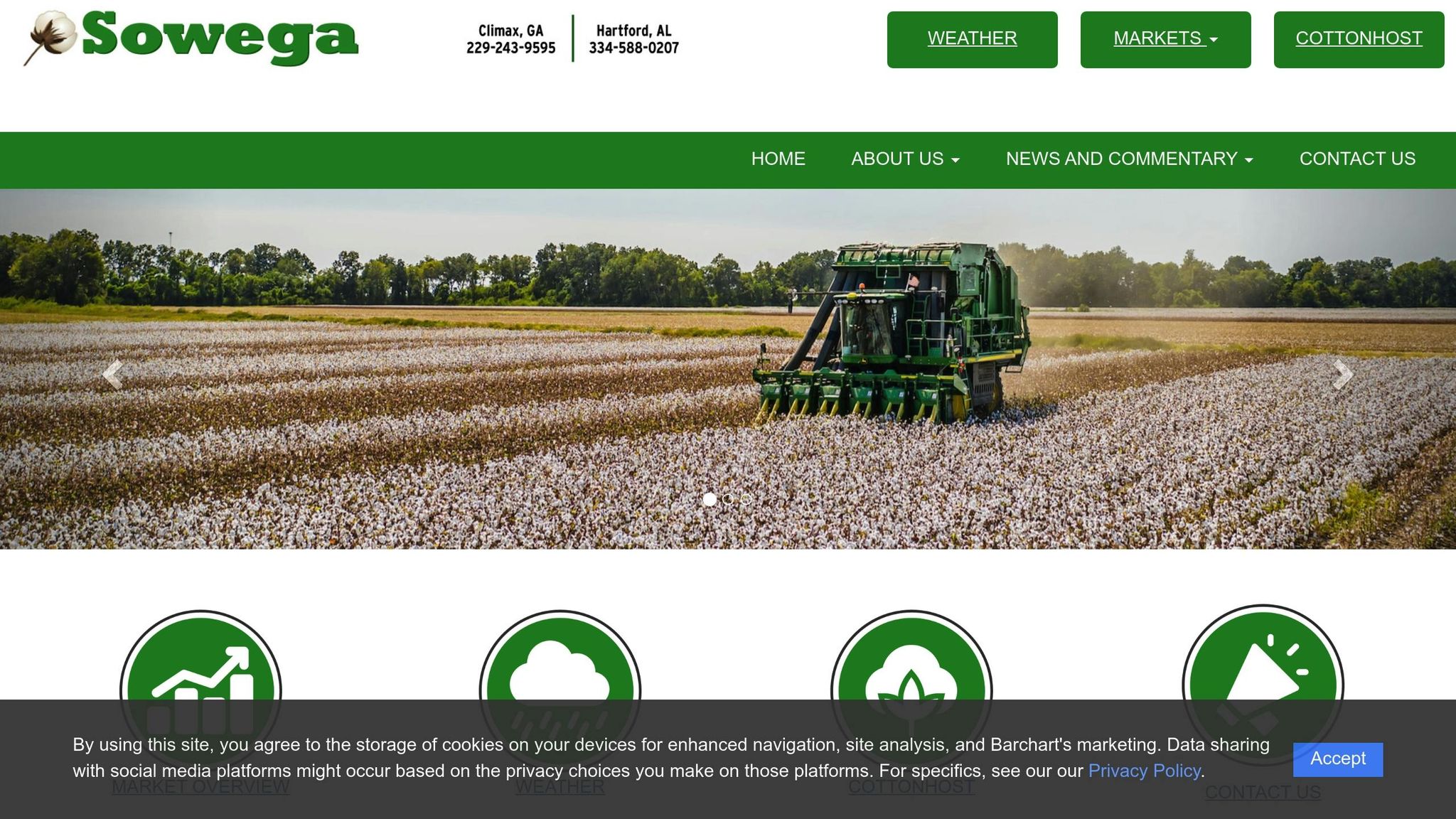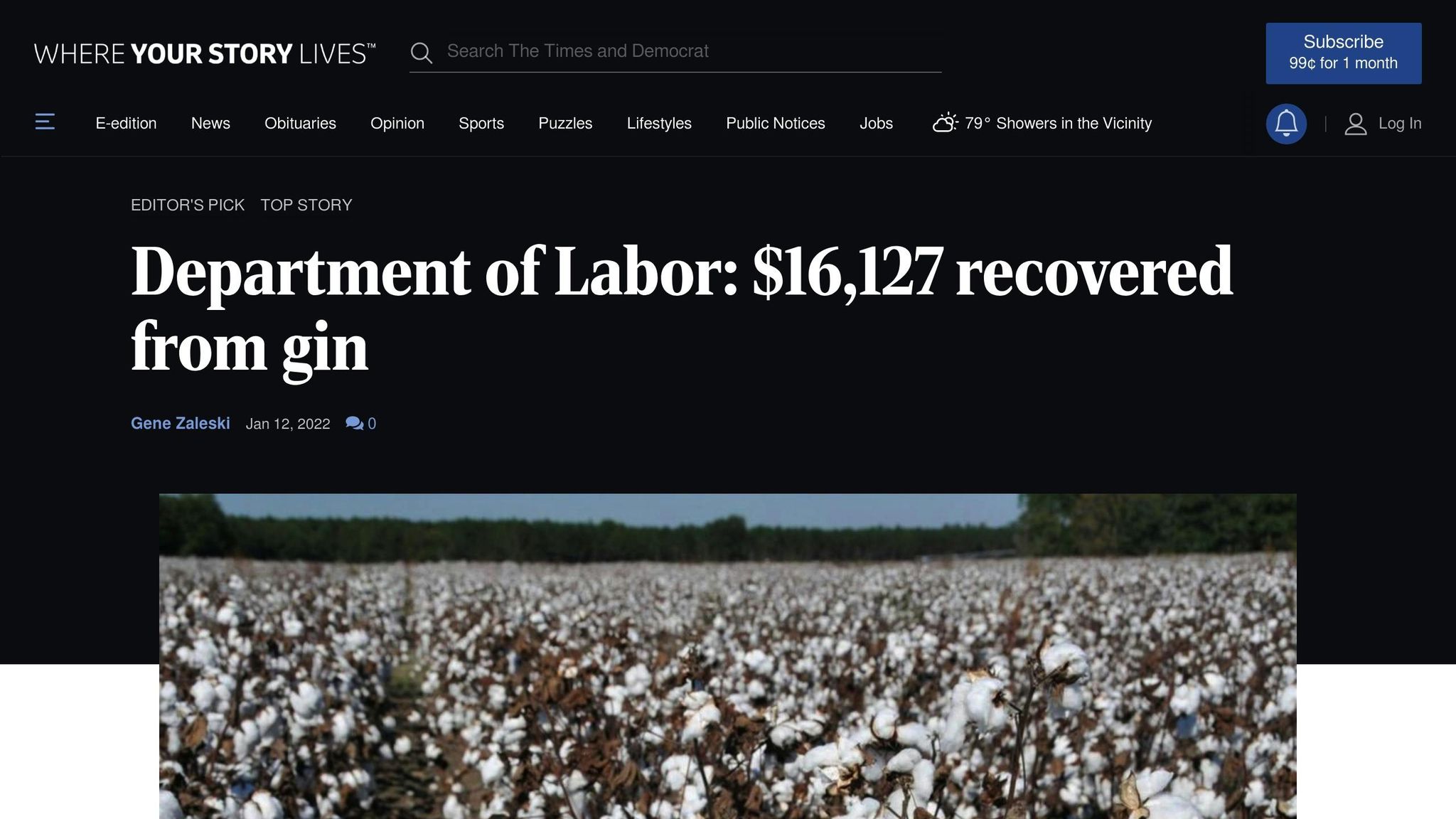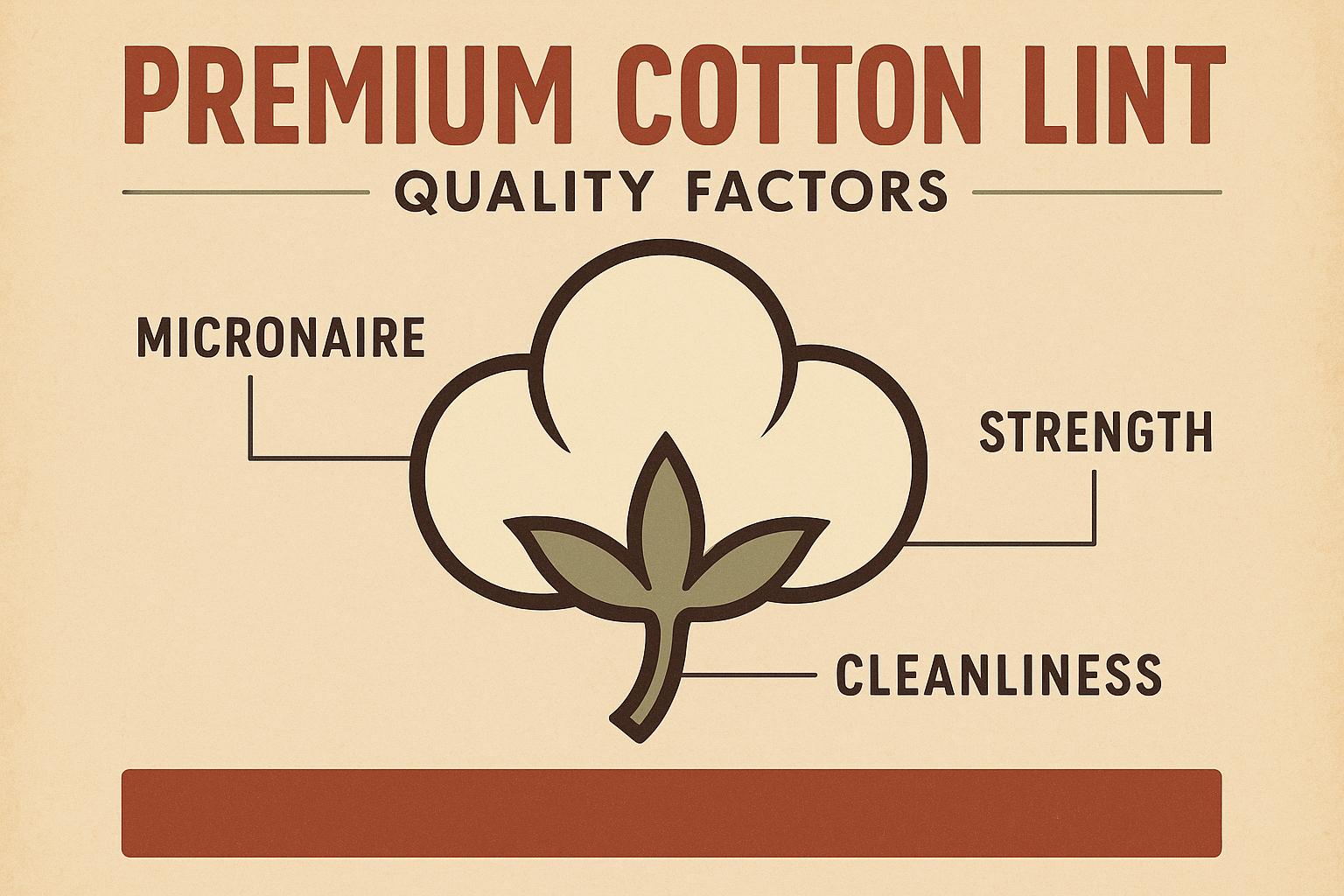81% of cotton gin employers violated federal labor laws between 2019 and 2021, affecting 620 workers and resulting in $282,626 in back wages and $152,539 in penalties. The most common issues include:
- Overtime pay errors: Not paying 1.5x the hourly rate for hours over 40 per week.
- Poor recordkeeping: Inaccurate documentation of wages and hours.
- Unsafe housing: Substandard living conditions for migrant workers.
- Incomplete wage statements: Missing or unclear payment details.
- Employment disclosure failures: Not informing workers of job terms.
Key Labor Laws for Cotton Gins:
- Fair Labor Standards Act (FLSA): Regulates minimum wage, overtime, and recordkeeping.
- Migrant and Seasonal Agricultural Worker Protection Act (MSPA): Covers wages, housing, transportation, and disclosures.
- H-2A Visa Program: Sets additional rules for hiring temporary foreign workers.
Major Penalties (2021-2022):
- Servico Inc. (AL): $48,918 for unsafe housing and wage violations.
- Sowega Cotton Gin (GA): $12,795 for overtime pay errors.
- Vallentines Gin (SC): $16,127 for recordkeeping and payroll issues.
How to Stay Compliant:
- Calculate overtime properly: Pay 1.5x the hourly rate for hours over 40.
- Meet housing standards: Ensure safe, sanitary living conditions for workers.
- Keep accurate records: Track hours, wages, and contracts.
- Follow transportation rules: Use insured vehicles with licensed drivers.
Takeaway: Cotton gin operators must prioritize compliance with wage, housing, and safety regulations to avoid fines and protect workers. Regular audits, clear documentation, and using compliance tools can help reduce risks.
Labor Laws That Apply to Cotton Gin Operations
Understanding federal labor laws is crucial for ensuring compliance in cotton gin operations. These laws protect workers' rights, regulate wages, and establish workplace standards. Cotton gin operators must navigate three key federal labor laws to meet these requirements.
Fair Labor Standards Act (FLSA) and Seasonal Exemptions
The Fair Labor Standards Act (FLSA) sets minimum wage and overtime rules for most workers, including those in cotton gin operations. Under the FLSA, employees working more than 40 hours in a week are entitled to overtime pay at 1.5 times their regular hourly rate.
Many cotton gin operations rely on seasonal workers, some of whom may qualify for specific exemptions under the FLSA. However, even with exemptions, employers must still meet minimum wage requirements and maintain accurate records of employee hours and wages to comply with the law.
Migrant and Seasonal Agricultural Worker Protection Act (MSPA)
The Migrant and Seasonal Agricultural Worker Protection Act (MSPA) provides comprehensive protections for migrant and seasonal agricultural workers. It covers wages, housing, transportation, worker notifications, and recordkeeping.
Under the MSPA, employers must give workers a clear disclosure of employment terms and provide accurate wage statements. If housing is offered, it must meet federal safety and health standards, and workers must be informed of the housing terms before moving in.
Transportation safety is another key requirement of the MSPA. Vehicles used to transport workers must meet specific safety standards, which vary depending on the distance traveled. For trips over 75 miles, stricter Department of Transportation (DOT) standards apply.
| Vehicle Type | 75 Miles or Less | More Than 75 Miles |
|---|---|---|
| Passenger automobile | DOL Standard 500.104 | DOL Standard 500.104 |
| Bus | DOL Standard 500.104 | DOT Standard 500.105 |
| Van (10+ passengers) | DOL Standard 500.104 | DOT Standard 500.105 |
| Truck/Semi-trailer | DOL Standard 500.104 | DOT Standard 500.105 |
H-2A Visa Program Compliance
The H-2A visa program allows agricultural employers to hire foreign workers for temporary agricultural jobs. Cotton gin operators employing H-2A workers must follow additional labor standards. Common violations include failing to provide safe, healthy housing and not clearly outlining housing terms before occupancy.
Farm labor contractors working with cotton gins are required to register with the U.S. Department of Labor and comply with specific rules, especially if they provide housing or transportation. Contractors who charge workers more than the actual cost of transportation may also face extra regulations under the MSPA.
The complexity of these overlapping regulations has led to frequent compliance challenges within the cotton gin industry.
Labor Law Enforcement Trends (2022-2025)
Recent enforcement efforts by the US Department of Labor (DOL) have highlighted ongoing issues with labor law compliance, particularly in the cotton gin industry. These investigations have uncovered widespread violations affecting hundreds of workers and resulted in significant financial penalties for employers.
Violation Statistics and Common Problems
Between November 2019 and March 2021, investigations revealed that most employers in the cotton gin industry violated key labor laws, including the Fair Labor Standards Act (FLSA), the Migrant and Seasonal Agricultural Worker Protection Act (MSPA), or H-2A visa program provisions.
The DOL recovered $282,626 in back wages and $10,785 in liquidated damages owed to 620 workers. Additionally, 37 employers faced $152,539 in civil money penalties.
The most common violations identified during this period include:
- Overtime pay issues: Many employers failed to calculate or pay the required overtime rate of 1.5 times the regular hourly wage for hours worked beyond 40 per week.
- Record-keeping lapses: Employers often failed to accurately document employee hours and wages.
- Employment disclosure failures: Under the MSPA, many employers did not provide workers with clear information about employment terms and conditions.
- Incomplete wage statements: Employers frequently neglected to provide accurate or complete wage statements to their employees.
- Substandard housing conditions: Employer-provided accommodations often failed to meet federal standards for safety, sanitation, and habitability.
These findings reflect broader patterns of noncompliance, particularly in the Southeast, and have shaped the DOL’s enforcement priorities.
"Our investigations show that far too many cotton gin operators are not compliant with federal labor law." - Juan Coria, Wage and Hour Division Regional Administrator
Regional Focus: Southeastern United States
The Southeastern United States has emerged as a focal point for labor law enforcement in the cotton gin industry. This region, a hub for cotton production, has also seen a high concentration of labor violations during DOL investigations.
States such as Alabama, Georgia, Mississippi, North Carolina, South Carolina, and Tennessee have experienced the most enforcement activity. These investigations revealed systemic issues, with notable cases including:
- Servico Inc. in Courtland, Alabama, which paid $48,918 in wages and penalties.
- Hi Grade Farm Supply in Winona, Mississippi, which paid $26,202.
- Gates Cotton Gin Inc. in Gates, North Carolina, which paid $25,557.
In response to these widespread violations, the Wage and Hour Division has launched an ongoing initiative focused on education, outreach, and enforcement in the region’s cotton and agriculture industries.
This targeted approach signals that cotton gin operators in the Southeast can expect continued scrutiny. Employers in the region must prioritize compliance to avoid substantial penalties and ensure fair treatment of their workforce.
Case Studies: Labor Law Violations in Cotton Gins
These real-world cases reveal the costly consequences of labor law violations in cotton gins across the Southeastern U.S.
Sowega Cotton Gin, Climax, GA (2022)

In 2022, an investigation by the U.S. Department of Labor uncovered overtime pay violations at Sowega Cotton Gin and Warehouse in Climax, Georgia. The company failed to pay H-2A workers properly, resulting in a fine of $12,795. Under the Fair Labor Standards Act, H-2A workers are entitled to the same overtime protections as domestic agricultural workers. This penalty highlights how crucial accurate payroll calculations are, especially during busy periods when overtime hours can quickly add up.
Servico Inc., Courtland, AL (2021)
Servico Inc., based in Courtland, Alabama, faced penalties under the Migrant and Seasonal Agricultural Worker Protection Act (MSPA). The company was fined $48,918 for a range of violations, including unsafe housing conditions and incomplete wage statements. The MSPA sets standards for wages, housing, transportation, disclosures, and recordkeeping. This case emphasizes the importance of maintaining safe living conditions and providing clear, accurate wage documentation for workers.
Vallentines Gin, Cope, SC (2021)

In Cope, South Carolina, Vallentines Gin Inc. was fined $16,127 after an investigation revealed issues with recordkeeping and overtime pay calculations. The company failed to maintain proper documentation of employee hours and miscalculated overtime for hours worked beyond 40 per week. This serves as a reminder that even small payroll errors can lead to significant fines - highlighting the need for systematic time tracking and regular payroll audits.
These cases showcase the ongoing challenges in labor law compliance within the cotton gin industry. Common issues include overtime miscalculations, poor recordkeeping, unsafe housing, and incomplete wage statements. With fines ranging from $12,795 to $48,918, these examples demonstrate the Department of Labor's dedication to enforcing labor standards and protecting workers' rights.
sbb-itb-0e617ca
How to Stay Compliant with Labor Laws
Recent cases highlight essential steps to avoid compliance issues and ensure workers' rights are protected. These examples emphasize the importance of accurate overtime calculations, meeting housing standards, and maintaining thorough records.
Taking lessons from past violations, implementing practical measures can significantly lower the risk of non-compliance.
Calculating Overtime Pay Under FLSA Rules
Mistakes in overtime calculations have resulted in hefty penalties, as seen in several cotton gin cases. With U.S. workers losing over $50 billion annually to wage theft and employers paying $3.24 billion in wage claims between 2017 and 2020, ensuring accurate overtime pay is non-negotiable.
Start by reviewing employee classifications regularly. Under federal law, employees earning less than $684 per week (or $35,568 annually) are entitled to overtime pay for any hours worked over 40 in a week.
- Hourly employees: Calculate overtime by multiplying the regular hourly rate by 1.5 for hours beyond 40. For instance, if an employee earns $20 per hour and works 45 hours, the 5 overtime hours would be paid at $30 per hour, adding up to $150.
- Salaried non-exempt employees: Determine their hourly rate by dividing the weekly salary by 40. For example, an employee earning $800 weekly would have a regular rate of $20 per hour, making their overtime rate $30 per hour.
Using reliable time-tracking tools, such as geofencing-enabled software, can help monitor work hours accurately and reduce disputes. Additionally, plan for overtime costs in your budget, especially during busy periods like peak cotton ginning seasons.
Meeting MSPA Housing Requirements
Violations of housing standards under the Migrant and Seasonal Agricultural Worker Protection Act (MSPA) highlight the need to follow federal and state safety requirements. If you provide housing for migrant or seasonal workers, display written terms of occupancy at the housing site or distribute them directly to workers.
Before hiring any farm labor contractor, confirm they have a valid Department of Labor registration certificate for the services they offer. If transporting workers, ensure vehicles are insured, operated by licensed drivers, and meet safety standards. Vehicle liability insurance must cover at least $100,000 per seat, capped at $5,000,000. For example, a 12-seat van (including the driver) requires $1.2 million in coverage.
These steps, combined with accurate recordkeeping, create a strong foundation for compliance.
Proper Recordkeeping and Documentation
Good recordkeeping is critical for proving compliance with labor laws. As Safe Ag Systems puts it, "Knowing your farm is compliant is very different from being able to prove your farm is compliant."
Digital tools can simplify audit preparation. Keep essential records like worker contracts, payroll data, training documents, and safety reports. Make sure all staff understand the importance of proper documentation.
OSHA requires employers with more than 10 employees to maintain records of serious work-related injuries and illnesses for at least five years. Additionally, fatalities must be reported within 8 hours, while incidents like amputations, eye loss, or hospitalizations must be reported within 24 hours.
To avoid violations, establish pre-start checklists, set clear safety goals, and design induction programs covering both safety protocols and wage policies.
Consulting HR professionals or legal experts can help ensure your practices align with state-specific regulations. Regular compliance audits are a proactive way to address potential issues before they escalate.
Finally, document job classifications and the reasoning behind them in detail. Clear justifications for classifications can be crucial during investigations.
Conclusion: Key Takeaways from Recent Cases
Investigations conducted by the U.S. Department of Labor between November 2019 and March 2021 revealed that roughly 80% of 71 cotton gin employers violated federal labor laws, leading to substantial financial penalties. These findings highlight the challenges discussed earlier and point to deeper compliance issues within the industry.
The most frequent violations included errors in overtime pay calculations, poor recordkeeping, and failing to properly disclose employment terms and conditions. These are foundational aspects of fair labor practices, and neglecting them has far-reaching consequences for both employees and employers.
One example is the Sowega case, where the omission of non-discretionary bonuses in overtime calculations led to $12,795.43 in back wages owed. Fiscal year 2021 also saw significant back wage collections related to Fair Labor Standards Act (FLSA) violations, emphasizing the importance of proactive compliance to avoid similar outcomes.
The Department of Labor has coupled its enforcement efforts with education to help employers improve compliance. As Juan Coria stated, "We encourage employers and stakeholders in the ginning industry to review their policy and practices and contact us to request compliance assistance". This dual approach offers cotton gin operators an opportunity to address potential issues before they result in costly penalties.
To move forward, cotton gin operators must adopt key strategies to ensure compliance. This includes implementing accurate overtime calculation systems, maintaining thorough records, and clearly communicating employment terms. Resources like the Wage and Hour Division's agriculture compliance assistance toolkit provide valuable guidance, helping operators safeguard their workforce while avoiding financial and reputational risks.
FAQs
What are common labor law violations in the cotton ginning industry, and how can employers stay compliant?
The cotton ginning industry often faces scrutiny for labor law violations, with some of the most common issues being failure to pay proper overtime wages, inaccurate record-keeping, and unsafe housing conditions for workers. Investigations reveal that many employers in this sector fall short of federal labor standards, frequently breaching the Fair Labor Standards Act (FLSA).
To address these issues and ensure compliance, employers should focus on a few key practices:
- Pay workers fairly: This includes meeting the federal minimum wage and providing overtime pay for any hours worked beyond 40 in a week.
- Maintain accurate records: Detailed payroll records are essential for transparency and accountability.
- Ensure safe living conditions: When housing is provided, it must be safe, clean, and meet basic standards.
For additional support, employers can consult the U.S. Department of Labor. This resource offers valuable guidance to help businesses understand their obligations, make necessary improvements, and avoid potential penalties while safeguarding their workforce.
What housing and transportation standards does the Migrant and Seasonal Agricultural Worker Protection Act (MSPA) require for cotton gin workers?
The Migrant and Seasonal Agricultural Worker Protection Act (MSPA) plays a crucial role in safeguarding the rights of cotton gin workers, particularly when it comes to housing and transportation. Under this law, employers offering housing are required to meet stringent health and safety standards. This includes ensuring proper sanitation, secure and stable structures, and overall livable conditions. Similarly, any transportation provided to workers must adhere to vehicle safety regulations, such as regular maintenance and proper licensing for drivers.
However, recent investigations have uncovered widespread non-compliance among cotton gins, leading to fines and efforts to recover unpaid wages for impacted workers. These violations highlight the ongoing need for the MSPA to ensure agricultural workers are treated fairly and provided with safe, humane working and living environments.
What can cotton gin operators do to comply with overtime pay rules under the Fair Labor Standards Act (FLSA)?
To meet the requirements of the Fair Labor Standards Act (FLSA) for overtime pay, cotton gin operators need to follow a few essential practices. First and foremost, make sure all employees are paid at least the federal minimum wage. For any hours worked beyond 40 in a single workweek, employees must receive overtime pay at a rate of time and a half - unless they qualify for specific exemptions under the law.
Keeping accurate records of hours worked and wages paid is not just a good habit - it’s a necessity for compliance and transparency. Regularly training staff on labor laws and payroll procedures can help minimize mistakes and misunderstandings. On top of that, periodic payroll audits can uncover and correct any issues before they escalate into costly penalties. By staying ahead of potential problems, operators can protect their business while ensuring employees are treated fairly.


